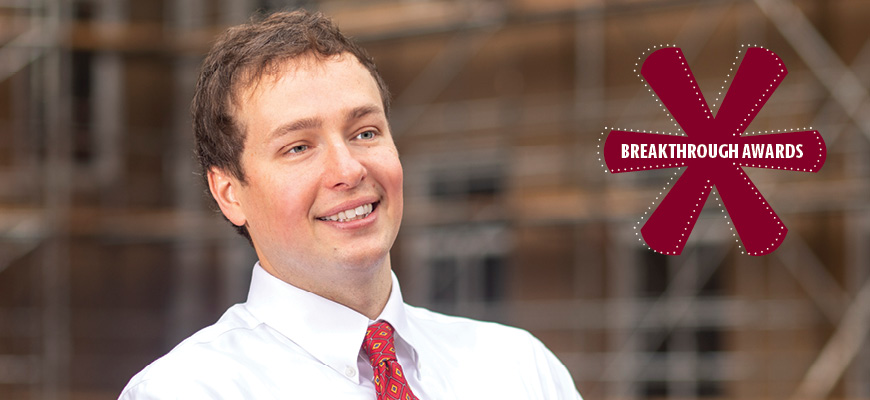
Breakthrough Star: Samuel McQuillin
Psychology researcher wants to mobilize lay community to help provide counseling to youth
Posted on: July 27, 2020; Updated on: July 27, 2020
By Page Ivey, [email protected], 803-777-3085
Millions of American children have serious mental health and behavioral challenges that could be improved with psychological counseling and support. But even if they had ready access to mental health care, there are not nearly enough counselors or psychologists to serve them.
What Samuel McQuillin wants to do is provide people who work with children every day — parents, teachers, community- and church-based volunteers — with science-based resources and tools to help children.
“We have all this evidence that things like cognitive behavioral therapy for anxiety and depression and motivational interviewing for helping people make behavior changes work,” says McQuillin, who earned his bachelor’s, master’s and Ph.D. at in the university’s College of Arts and Sciences. “What we’re trying to do is get those things that work to people who are not professionals or who are a different type of professional.
“There is good evidence that in many circumstances, there is no difference in effectiveness between a lay community helper and a psychologist.”
Mentoring is a passion McQuillin has had since he volunteered to be a counselor in a program for kids who have ADHD when he was a psychology freshman at South Carolina.
Dr. McQuillin’s work is also an exemplary model of how applied research can advance the university’s mission to engage and benefit the local community.
Jane Roberts and Kate Flory, psychology professors
“It was an in-school program and you got trained in behavior modification and helping kids stay organized and motivated,” McQuillin says. “There were grad students and really smart people all around me who were doing research and trying to improve the effectiveness of the program and documenting it.
“That’s where I saw this other side of research, where there are these problems that everyone talks about but here is a systematic way to study and understand whether or not we are actually helping these people.”
While the idea of reaching out through mentoring, or task-shifting, is not new, McQuillin’s approach to use the public school system and people who are already seeing the students on a daily basis is a bold re-imagining of the use lay helpers to treat minor mental health issues.
“Dr. McQuillin’s work is also an exemplary model of how applied research can advance the university’s mission to engage and benefit the local community,” professors Jane Roberts, psychology department chair, and Kate Flory, associate chair, said in a letter of recommendation for McQullin’s Breakthrough Star award.
As part of his research, McQuillin — a father of three — manages the university’s Academic Mentoring Program for Education and Development, a school-based mentoring program for middle-school students who live in low resource communities.
“This program offers USC students an outside-of-the classroom opportunity to be matched with a young person who wants help navigating the transition from elementary to middle school,” Roberts and Flory said. “As part of this experience, students are trained in state-of-the-art, evidence-based helping strategies and are supervised in real-world experiences.”
McQuillin says critics of task-shifting say only a small percentage of lay helpers will actually do the work and that measures have to be built in to prevent inappropriate behavior. He agrees that regulation of lay helpers is important, but says it is something that can be done by structuring mentor-student meetings in large groups under supervision of Ph.D.-trained psychologists.
As to the numbers, McQuillin says that if just 5 percent of the roughly 4 million people in the U.S. who volunteer to work with youth actually complete the evidence-based counseling, that is still larger than the number of licensed, Ph.D.-trained psychologists.
“Think about all the lay helpers that are out there: clergy at churches; room parents,” he says. “There’s just not a great infrastructure for mobilizing this lay workforce. So it’s a worthy investment even if we can only get a very small portion of them to do it.”
Share this Story! Let friends in your social network know what you are reading about